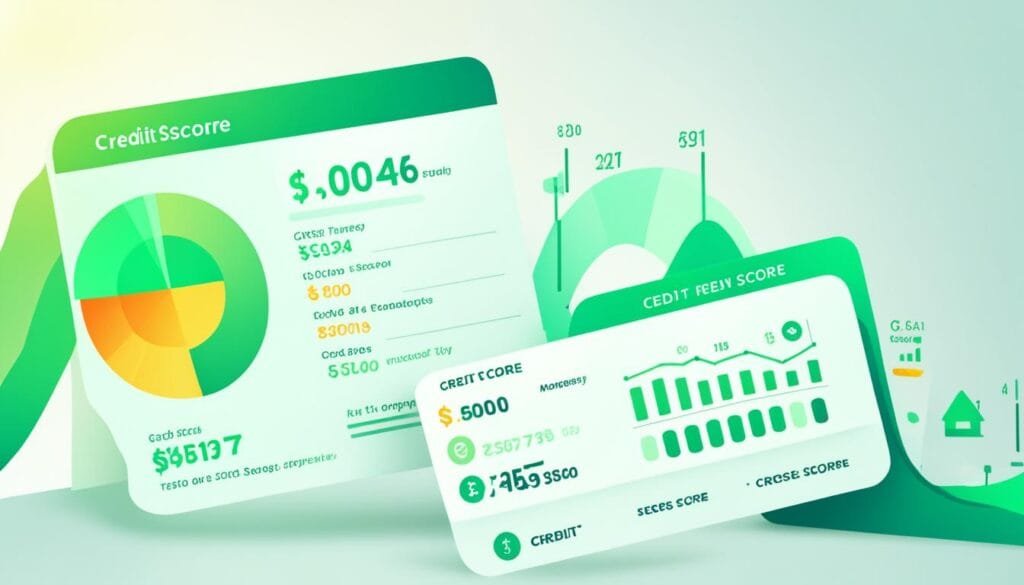Welcome to our comprehensive guide on understanding the length of credit history and its importance in managing your credit. Your credit history length is a crucial factor that affects your credit score and plays a significant role in lenders’ decisions. In this article, we will delve into the details of how the length of your credit history is calculated, its impact on your credit score, what constitutes a good length of credit history, and more.
Building a solid credit history takes time, and it’s essential to optimize your credit history length to improve your credit score. By understanding how this factor influences your creditworthiness, you can make informed decisions and take steps to manage your credit effectively.
Key Takeaways:
- Your credit history length refers to the age of the accounts on your credit reports.
- It accounts for a significant percentage of your FICO® Score and VantageScore credit score.
- Having a solid length of credit history can potentially improve your credit score.
- Factors such as the age of your credit accounts, specific account duration, and time since last usage impact the calculation of credit history length.
- The older your credit history, the better its impact tends to be on your credit score.
How is the Length of Your Credit History Calculated?
Understanding how your length of credit history is calculated is essential to optimizing your credit score. Credit scoring models use several factors to determine the length of your credit history and its impact on your overall creditworthiness. Let’s explore the key factors that influence the calculation.
Factors Impacting Credit History Length
- Average Age of Credit Accounts: The first factor is the average age of your credit accounts. This refers to the average length of time all your accounts have been open. Credit bureaus look at the age of each account and calculate the average to assess the overall length of your credit history.
- Oldest Account: The second factor is the age of your oldest credit account. This represents the length of time since you first opened a credit account. Generally, a longer history with your oldest account indicates a more established credit history.
- Newest Account: The third factor is the age of your newest credit account. This accounts for the length of time since you recently opened a credit account. Including the newest account helps provide a comprehensive view of your credit history.
- Time Since Last Account Usage: The final factor is the duration since you last used an account. If you haven’t utilized a particular account for an extended period, it can impact the calculation of your credit history length. Regularly using your accounts demonstrates active credit management.
By analyzing these factors, credit scoring models determine the length of your credit history and assign points accordingly. The longer your credit history, the more points you can earn in this category, positively impacting your credit score.
Understanding how the credit scoring system calculates the length of your credit history can empower you to take steps to optimize it. By maintaining a longer average age of credit accounts, keeping your oldest account active, regularly utilizing your newest account, and ensuring recent usage of all accounts, you can maximize the length of your credit history and improve your credit score.
Next, let’s explore how the length of your credit history affects your credit score and why it’s crucial to maintain a good credit history length.
How Does Length of Credit History Affect Your Credit Score?
The impact of credit history length on your credit score is significant. It is worth understanding how this factor influences your overall creditworthiness. Length of credit history contributes 15 percent to your FICO Score and approximately 20 percent to your VantageScore credit score.
While these percentages may appear small, they can have a substantial impact on your credit score. For instance, a credit score of 700 can have over 100 points influenced by the length of your credit history.
Why does the length of credit history matter?
Older accounts in good standing tend to positively affect your credit score. The logic behind this is that the longer you have managed credit responsibly, the more confident lenders can be in your ability to handle credit in the future.
However, it is essential to keep in mind that credit history length is not the sole factor determining your credit score. Other credit score factors, such as payment history and credit utilization, also play a significant role.
Understanding FICO Score and VantageScore Credit Score:
The FICO Score is a widely used credit scoring model that considers various factors, including credit history length, to assess creditworthiness. On the other hand, the VantageScore credit score is another common scoring model that also takes into account the length of credit history when evaluating your creditworthiness.
Now, let’s take a closer look at how credit history length impacts your credit score by exploring FICO Score and VantageScore credit score.
| Percentage Contribution to Credit Score | Key Credit Score Factors | |
|---|---|---|
| FICO Score | 15% | Length of credit history, payment history, credit utilization, credit mix, and new credit |
| VantageScore Credit Score | Approximately 20% | Length of credit history, payment history, credit utilization, credit age, and credit inquiries |
As you can see from the table, both the FICO Score and VantageScore credit score allocate a significant percentage to the length of credit history. This further emphasizes the importance of maintaining a healthy credit history over time.
Take note:
While credit history length is significant, it is just one piece of the credit score puzzle. It is essential to focus on other credit score factors as well to achieve a strong credit profile.

Having understood the impact of credit history length on your credit score, let’s move on to exploring what constitutes an ideal credit history length and how to optimize it for better credit management.
What is a Good Length of Credit History?
When it comes to determining a good length of credit history, there is no one-size-fits-all answer. However, a study conducted by FICO revealed some interesting findings. People with FICO Scores of 800 or higher had an average age of credit accounts of 128 months, which is a little over 10.5 years. While this may seem like a long time, it’s important to understand that earning a good credit score doesn’t necessarily require a decade or more.
For individuals building their credit for the first time, it is possible to become eligible for a FICO Score within six months of opening an account. VantageScore credit scores can be obtained within a month or two. In both cases, this means that positive credit history can be established relatively quickly.
It’s crucial to remember that the length of your credit history is just one factor among several that contribute to your credit score. Positive actions such as maintaining a good payment history and keeping your credit utilization low can compensate for a shorter credit age. So even if your credit history may not be as long as someone with a score of 800+, you can still achieve a good credit score by practicing responsible credit management.

Comparison of Credit Score Benchmarks
| Credit Score Range | Credit Score Category |
|---|---|
| 300 – 579 | Poor |
| 580 – 669 | Fair |
| 670 – 739 | Good |
| 740 – 799 | Very Good |
| 800+ | Exceptional |
While there is no specific threshold for what constitutes a “good” credit history length, the benchmark credit score ranges offer a general guide for understanding where your credit score falls. Keep in mind that credit scores may vary depending on the credit scoring model used, such as FICO or VantageScore. Aim to maintain a credit score within the “good” or “very good” range to enhance your chances of getting favorable loan terms and interest rates.
Does Closing a Credit Card Hurt Your Score?
Closing a credit card can potentially lower your credit score, but this is often misunderstood. When a credit card is closed, the account may remain on your credit report for up to 10 years if it is positive. Closing a credit card should not reduce your length of credit history immediately. However, it can impact your credit utilization rate if it decreases your overall credit limit, which can indirectly affect your credit score. It is generally advisable to keep credit cards open for as long as possible, unless there is a valid reason for closing the account.
How Do Credit Inquiries Affect Credit History Length?
Credit inquiries can have a varying impact on credit history length. Multiple inquiries within a short period can lower the score, while occasional inquiries may have little effect. Generally, inquiries stay on the report for two years, affecting the score for the first year. Balancing inquiries is crucial for maintaining a healthy credit history.
Conclusion
The length of your credit history has a significant impact on your credit score and the decisions of lenders. It is important to pay attention to and optimize your credit history length in order to improve your credit score. While there is no definitive answer to how long your credit history should be, building a solid credit history requires time, patience, and responsible credit management.
It is crucial to remember that the length of your credit history is just one factor among many that influence your credit score. Therefore, it is essential to consider other credit score factors as well. By understanding the impact of the length of your credit history, you can make informed decisions to effectively manage your credit.
Take steps to manage your credit score by maintaining a good payment history, keeping your credit utilization low, and avoiding excessive credit applications. These practices, combined with optimizing the length of your credit history, will help you achieve a higher credit score and increase your chances of obtaining better loan terms and interest rates.
FAQ
How long should my credit history be?
There is no definitive answer to how long your credit history should be. Building a solid credit history takes time and responsible credit management.
What factors impact the length of my credit history?
The amount of time your credit accounts have been open, the specific accounts’ age, and the time since you last used the accounts all impact the length of your credit history.
How does the length of credit history affect my credit score?
The length of credit history accounts for 15 percent of your FICO Score and around 20 percent of your VantageScore credit score. The older your length of credit history, the better it tends to be for your credit score.
What is considered a good length of credit history?
While there is no perfect “age of credit,” people with 800+ FICO Scores had an average age of credit accounts of over 10.5 years. However, positive payment history and credit utilization can compensate for a younger credit age.
Does closing a credit card hurt my credit score?
Closing a credit card may not immediately reduce your length of credit history, but it can indirectly impact your credit score if it decreases your overall credit limit. It is generally advisable to keep credit cards open for as long as possible, unless there is a valid reason for closing the account.
How can I optimize my credit history length?
Pay attention to your credit history length by keeping accounts open, using credit responsibly, and maintaining positive payment history. By understanding the impact of length of credit history, you can make informed decisions to manage your credit effectively.

